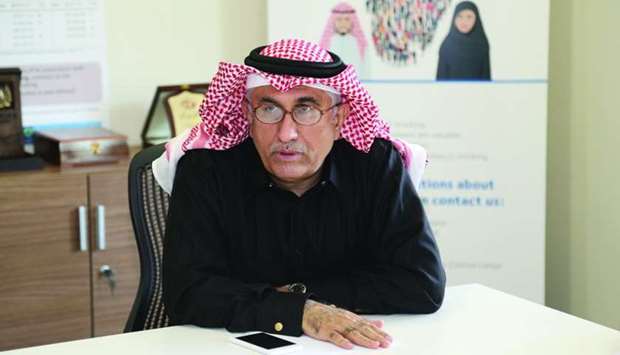There has been a marked increase in the number of people quitting smoking after the introduction of excise tax on tobacco products from January 1, a top official of Hamad Medical Corporation (HMC) has stated.
“The new tax has made many people rethink about smoking,” said Dr Ahmad al-Mulla, head of the HMC Tobacco Control Center told a press conference Wednesday.
“There is no specific data yet but the number of calls received through the hotline for quitting, has increased significantly. While talking to doctors, people have revealed it is because of the hike in the prices, especially those who smoke more than one packet a day, young people and low income workers,” explained Dr al-Mulla.
The Tobacco Control Center recorded 4,000 visits in 2018 and the number of people seeking to quit are increasing after awareness campaigns.
“Among them, 30 to 35% quit smoking. One person makes at least three to five visits as part of the quitting programme. If they stop smoking for six months, it is considered as quitting the habit. Usually those who smoke 20 to 30 cigarettes a day, are considered heavy smokers,” he continued.
According to the official, patients attending the clinic receive one-on-one counselling and appropriate nicotine replacement or pharmaceutical support. “Patients also undergo a full assessment, including a complete medical history and related evaluations, such as lung function tests. Medications are prescribed for majority of people and psychological interventions are done to modify the lifestyle,” noted Dr al-Mulla.
Dr Jamal Basuhai, a smoking cessation specialist at HMC, said that most people who come to the clinic smoke cigarette, while some smoke sheesha, and others chew several tobacco substances. Some also smoke electronic cigarettes and sheesha.
“Second hand smoking can harm children and others. There is no safe zone for second hand smoking. It is really dangerous. In our awareness activities, we highlight about it,” pointed out Dr Basuhai.
“Now, there is also the third-hand smoke which is residual nicotine and other chemicals left on indoor surfaces by tobacco smoke. People are exposed to these chemicals by touching contaminated surfaces or breathing while at these areas,” he explained.
“A non-smoker gets exposed to a room or place or car where someone has smoked. The tobacco substances accumulate in the car, room or any place. Even if a smoker talks to you for more than 30 minutes, it can spread toxic substances,” he highlighted.
On the National Sport Day next Tuesday, the Tobacco Control Center will hold awareness activities at Katara about its services and how to access the services. Also experts will measure carbon monoxide and lung volume of smokers and advise or refer them to the Tobacco Control center if needed.
Dr Ashour Ibrahim, clinical psychologist, Noor Hassan, quality controller, Tobacco Control center also attended the press conference.
“There is no specific data yet but the number of calls received through the hotline for quitting, has increased significantly. While talking to doctors, people have revealed it is because of the hike in the prices, especially those who smoke more than one packet a day, young people and low income workers,” explained Dr al-Mulla.
The Tobacco Control Center recorded 4,000 visits in 2018 and the number of people seeking to quit are increasing after awareness campaigns.
“Among them, 30 to 35% quit smoking. One person makes at least three to five visits as part of the quitting programme. If they stop smoking for six months, it is considered as quitting the habit. Usually those who smoke 20 to 30 cigarettes a day, are considered heavy smokers,” he continued.
According to the official, patients attending the clinic receive one-on-one counselling and appropriate nicotine replacement or pharmaceutical support. “Patients also undergo a full assessment, including a complete medical history and related evaluations, such as lung function tests. Medications are prescribed for majority of people and psychological interventions are done to modify the lifestyle,” noted Dr al-Mulla.
Dr Jamal Basuhai, a smoking cessation specialist at HMC, said that most people who come to the clinic smoke cigarette, while some smoke sheesha, and others chew several tobacco substances. Some also smoke electronic cigarettes and sheesha.
“Second hand smoking can harm children and others. There is no safe zone for second hand smoking. It is really dangerous. In our awareness activities, we highlight about it,” pointed out Dr Basuhai.
“Now, there is also the third-hand smoke which is residual nicotine and other chemicals left on indoor surfaces by tobacco smoke. People are exposed to these chemicals by touching contaminated surfaces or breathing while at these areas,” he explained.
“A non-smoker gets exposed to a room or place or car where someone has smoked. The tobacco substances accumulate in the car, room or any place. Even if a smoker talks to you for more than 30 minutes, it can spread toxic substances,” he highlighted.
On the National Sport Day next Tuesday, the Tobacco Control Center will hold awareness activities at Katara about its services and how to access the services. Also experts will measure carbon monoxide and lung volume of smokers and advise or refer them to the Tobacco Control center if needed.
Dr Ashour Ibrahim, clinical psychologist, Noor Hassan, quality controller, Tobacco Control center also attended the press conference.


